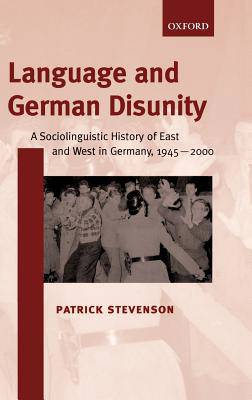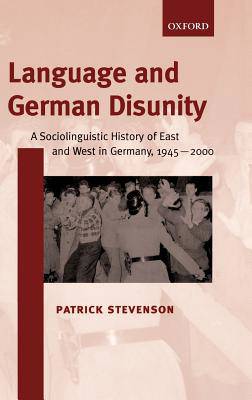
- Retrait gratuit dans votre magasin Club
- 7.000.000 titres dans notre catalogue
- Payer en toute sécurité
- Toujours un magasin près de chez vous
- Retrait gratuit dans votre magasin Club
- 7.000.0000 titres dans notre catalogue
- Payer en toute sécurité
- Toujours un magasin près de chez vous
Language and German Disunity
A Sociolinguistic History of East and West in Germany, 1945-2000
Patrick Stevenson
Livre relié | Anglais
426,95 €
+ 853 points
Format
Description
This book investigates the history of national disunity in Germany since the end of the Second World War from a linguistic perspective: what was the role of language in the ideological conflicts of the Cold War and in the difficult process of rebuilding the German nation after 1990? In the first part of the book, Patrick Stevenson explores the ways in which the idea of 'the national language' contributed to the political tensions between the two German states and to the different social experiences of their citizens. He begins by showing how the modern linguistic conflict between east and west in Germany has its roots in a long tradition of debates on the relationship between language and national identity. He then describes the use of linguistic strategies to reinforce the development of a socialist state in the GDR and argues that they ultimately contributed to its demise. The second part considers the social and linguistic consequences of unification. The author discusses the challenges imposed on east Germans by the sudden formation of a single 'speech community' and examines how conflicting representations of easterners and westerners - for example, in personal interactions, the media, and advertising - have hindered progress towards national unity. German division and re-unification were crucial to the development of Europe in the second half of the twentieth century. This fascinating account of the relationship between language and social conflict in Germany throws new light on these events and raises important questions for the study of divided speech communities elsewhere. The book will interest sociolinguists, historians, sociologists, and political scientists.
Spécifications
Parties prenantes
- Auteur(s) :
- Editeur:
Contenu
- Nombre de pages :
- 288
- Langue:
- Anglais
Caractéristiques
- EAN:
- 9780198299691
- Date de parution :
- 13-03-03
- Format:
- Livre relié
- Format numérique:
- Genaaid
- Dimensions :
- 156 mm x 234 mm
- Poids :
- 580 g

Les avis
Nous publions uniquement les avis qui respectent les conditions requises. Consultez nos conditions pour les avis.






